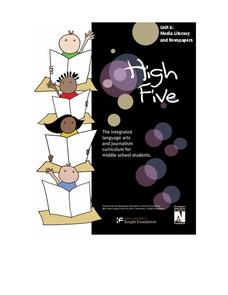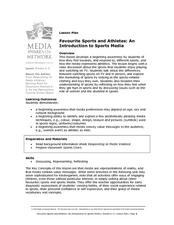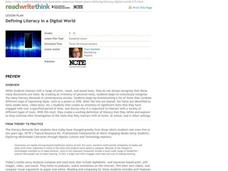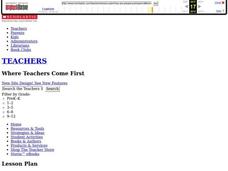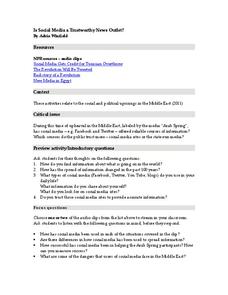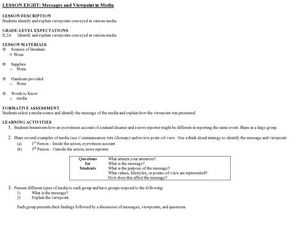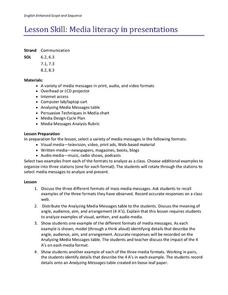Curated OER
Media Babies
What is a media baby? Discuss at what age children should be exposed to electronic media. After reading an article, they identify the types of media products for infants and toddlers. Learners will predict the effects of media on the...
Curated OER
Find The Hidden Message: Media Literacy in Primary Grades
Learners practice listening to and reading various types of media and text. In groups, learners use video, newspapers, magazines, and more to compare and contrast different types of information. They identify the differences between fact...
Curated OER
Nutrition and the Media: Cereal Box Consumerism
How many treats do you buy each week? Learners investigate diets and how the media tricks consumers into purchasing unhealthy snacks. They will investigate the designs and logos affiliated with cereal boxes and identify specific phrases...
Ontario
Critical Literacy—Media Texts
Media texts convey both overt and implied messages. As part of their study of media, class members analyze the language, form, techniques, and aesthetics in a variety of media texts.
American Press Institute
High Five: Media Literacy and Newspapers
Teach the five different types of media with the first of three in a media literacy unit. Learners create and propose a final newspaper project, which must address information covered throughout the unit.
ReadWriteThink
Critical Media Literacy: Commercial Advertising
Commercial advertising—we can't get away from it, but do we realize just how often we are being advertised to? With this lesson plan, scholars analyze mass media to identify how its techniques influence our daily lives. Learners browse...
Curated OER
How the Media Uses Polling Data in Presidential Election Coverage
Students research and analyze polling data in journalism. They discuss reasons that polling data is included in media coverage of presidential elections.
Media Smarts
Bias in News Sources
As young consumers of media, it is important for high schoolers to explore concepts of bias and prejudice, and how they may be present in media. After discussing ideological messages that media can contain, individuals complete a warm-up...
Curated OER
Favorite Sports and Athletes: an Introduction to Sports Media
Even young children watch sports and like team logos and products. It's never too early to think critically about what's onscreen. This exercise develops awareness that media communicate values (i.e. who participates in sports and who...
ReadWriteThink
Defining Literacy in a Digital World
What skills are necessary to interact with different types of text? Twenty-first century learners live in a digital world and must develop a whole new set of skills to develop media literacy. Class members engage in a series of...
Crabtree Publishing
Why Does Media Literacy Matter?
Criticism of news and entertainment journalism is at an all-time high. Help 21st-century learners develop the media literacy skills they need to become critical consumers with a three-lesson guide the looks at persuasive techniques used...
Curated OER
Media Timeline
Young scholars complete a media campaign worksheet about the awareness of people with disabilities. In this disabilities lesson plan, students write a campaign to reduce fear when making people aware of disabilities.
Curated OER
Through Many Lenses: How are Countries Depicted by the Media?
If you plan to utilize the ABC miniseries, "The Path to 9/11" in your classroom, consider incorporating media literacy and research skills. After (or while) learners view the series, they discuss ways information can differ from source...
PBS
Interviewing: The Art of Asking Questions
Interviewing skills are important, even outside of a news reporter's desk or employer's office. Take your class through the process of interviewing people they don't know with a set of case studies featuring journalists and various...
Prestwick House
Understanding Language: Slant, Spin, and Bias in the News
We live in a time of fake news, alternative realities, and media bias. What could be more timely than an activity that asks class members to research how different sources report the same topic in the news?
Curated OER
How are People Portrayed by Different Media?
Your 9th - 12th graders can hone their analysis and critical thinking skills by studying the way a subject is portrayed across media types. They examine how various print, visual, and online sources have portrayed key players in the 9/11...
Curated OER
Is Social Media a Trustworthy News Outlet?
Examine the role of social media in social and political uprisings. Pupils listen to NPR audio clips about social media and the Arab Spring and read an article that proposes the idea that revolution will not happen through social media....
Curated OER
News Journalism Across the Media: Introduction
Although students are aware of news as information that influences their perceptions of the world, they are often unaware of the various ways to present that information. Encourage them to investigate, discuss, analyze and make valuable...
Curated OER
Identify Intended Media Messages
How does media convey different messages? Use this lesson to explore media by identifying and analyzing selected images. Middle schoolers analyze a poster and discuss the intended meaning of the imagery and how it makes them feel. They...
Curated OER
Messages and Viewpoint in Media
Explore media point of view. In this literacy and current events lesson, pupils identify examples of first and third person point of view in media articles. They analyze examples of media, interpret the messages, and determine purposes...
Curated OER
Counteracting Media Stereotyping
Discuss media stereotypes with your emerging consumers. They view a television program to identify gender bias. After discussing the clip as a class, each learner writes a story showing more equitable roles. Or consider having them...
Curated OER
Analyzing Messages in Various Media
Explore communication through media by analyzing different advertisements and artwork. Budding artists view videos, websites, plays, and other artistic endeavors while discussing the true meaning of the work with their classmates. They...
Curated OER
How Media Shapes Perception
Students explain the impact that the media may have in shaping their intellectual and emotional responses to current events. They examine broadcast and Web-based news sites to find subtexts through the use of language, audio, and visual...
Curated OER
Media Literacy in Presentations
Middle schoolers study the three types of mass media messages: visual media, written media, and audio media. After a class discussion which has them list examples of each, learners get into pairs and work on analyzing the "Four A's" in...






